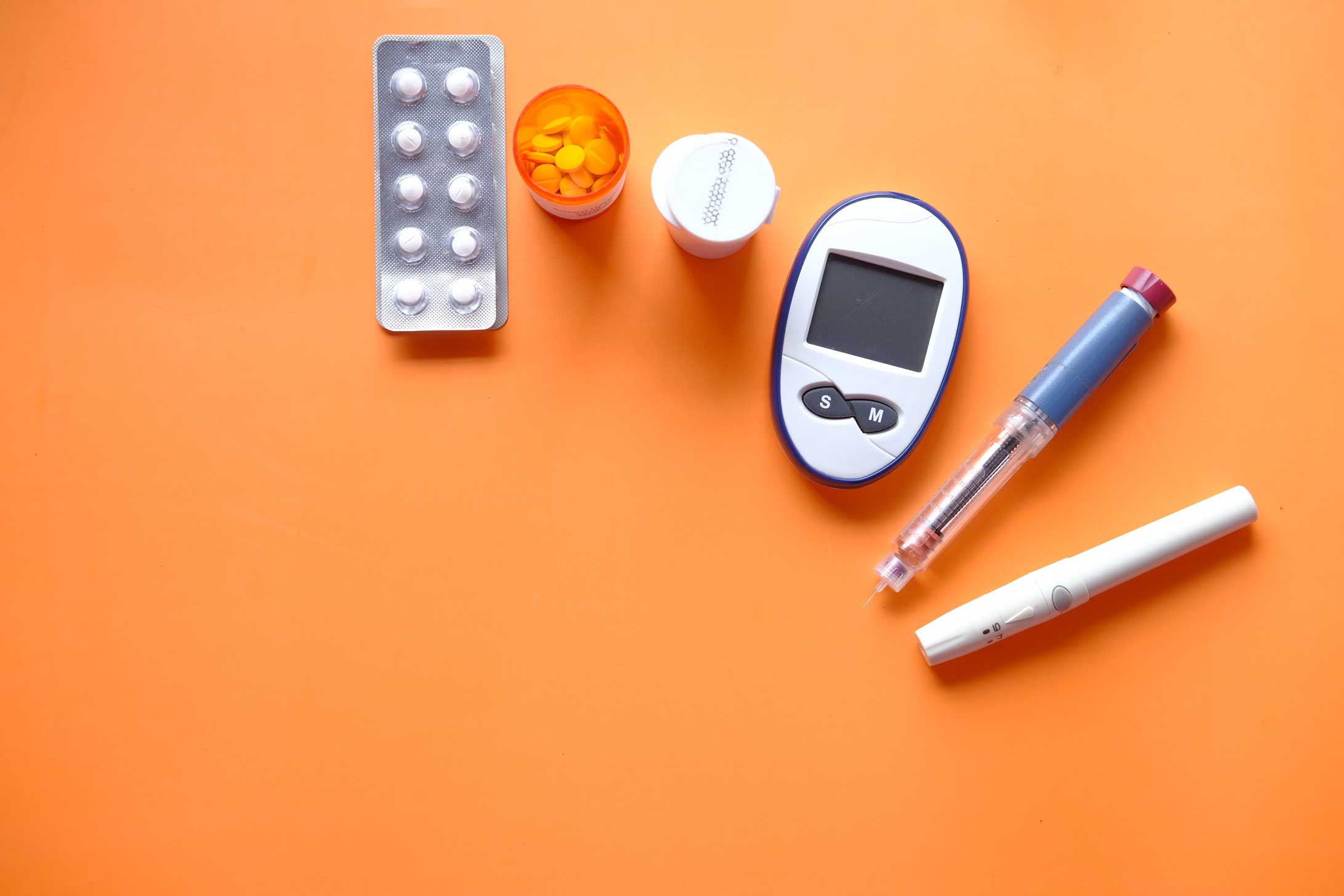Is Diabetes An Autoimmune Disease? How To Tell The Difference Between Type 1 + Type 2

“Is diabetes an autoimmune disease?” It’s a question I get asked almost daily in my telehealth functional medicine clinic, and for good reason. Close to 11% of the U.S. population (1) is diagnosed with diabetes and 97% of all Americans over 18 have pre-diabetes, making understanding the intricacies of this condition vital for overcoming this far too common health problem.
But the answer to this question isn’t a straightforward “yes” or “no”, as there are different types of diabetes with their own characteristics and underlying mechanisms. So, in order to help put you on the right path toward healing, let’s uncover the key differences between Type 1 and Type 2 diabetes, how they each relate to autoimmunity, and what you can do today to get your blood sugar levels, and overall health, back on track.
ARTICLE CONTINUES BELOW
Make Your Life a Cleanse
SUBSCRIBER-ONLY GUIDES FOR GUT HEALTH, VIBRANT ENERGY, HEALTHY FOOD & CLEAN ALCOHOL
Get FREE access to these + giveaways, recipes, & discount codes in personal emails from Dr. Will Cole.
What is diabetes?
Diabetes is a prevalent metabolic disorder characterized by high blood sugar levels. This condition happens when your body can’t produce enough insulin, as in the case with Type 1 diabetes, or when your cells become resistant to the insulin that is produced, as in the case of Type 2 diabetes.
Insulin’s primary function is to facilitate the uptake of glucose - a byproduct of sugar - by your cells, allowing them to convert this sugar into energy. Think of insulin as a key that unlocks your cells and enables glucose to enter and fuel essential metabolic processes. When insulin levels are out of balance, it not only impacts energy metabolism, but it can also lead to a wide range of health problems including weight loss resistance and cardiovascular disease.
Understanding autoimmune diseases
In order to really answer the question “is diabetes an autoimmune disease”, we have to understand what causes an autoimmune disease to develop in the first place.
Think of autoimmune disease as a case of mistaken identity. Regardless of what autoimmune disease you have, your body’s immune system ends up accidentally triggering an inflammatory response and starts producing antibodies against your own tissues, leading to breakdown and destruction in a certain area of your body.
But if your immune system is naturally designed to protect against viruses and bacteria, why would it suddenly mistake your body for an enemy? The truth is, researchers don’t know yet what exactly causes autoimmune disease, but they believe it has to do with a genetic weakness being triggered by an immune system response to toxins, poor diet, stress, or chronic viral, yeast, bacterial, or parasitic infections. And what do all of these have in common? Out-of-control inflammation.
The consequences of autoimmune disease are diverse, ranging from localized tissue damage to systemic inflammation affecting multiple organs. That’s why if you have one autoimmune disease, you are at an increased likelihood for developing another. There are over 80 known (2) autoimmune diseases (and many more with an autoimmune component) but these are some of the ones I see most often in my telehealth functional medicine clinic:
Type 1 diabetes and autoimmunity
Now that we understand what autoimmune diseases are, we can see clearly why Type 1 diabetes is classified as an autoimmune condition. Often diagnosed in childhood or adolescence, Type 1 diabetes occurs as a result of your body’s immune system attacking and destroying the insulin-producing beta cells in your pancreas. This results in a lack of insulin, making lifelong insulin replacement therapy necessary for your body to function the way that it is designed. According to the American Diabetes Association, (1) out of the 38.4 million Americans diagnosed with diabetes, Type 1 diabetes only accounts for 2 million of those cases.
Type 2 diabetes and autoimmunity
In contrast to Type 1 diabetes, Type 2 diabetes is primarily driven by lifestyle factors and genetic predisposition. In Type 2 diabetes, cells in the body become resistant to the effects of insulin, resulting in elevated blood sugar levels. Your pancreas, in response, may produce more insulin initially, but over time, it may not keep up with the demand.
Unlike the more sudden onset of Type 1 diabetes, Type 2 diabetes typically develops gradually, and it is often diagnosed in adulthood since years of unhealthy lifestyle factors such as sedentary behavior, poor diet, and obesity are major contributors to the development of this condition.
The connection between Type 1 and Type 2 diabetes
Although Type 2 diabetes isn’t officially considered an autoimmune condition, emerging research suggests what we in functional medicine have known for years: That there may be autoimmune components involved in Type 2 diabetes.
While not as pronounced as in Type 1 diabetes, studies have indicated the presence of low-grade inflammation and immune system activation in individuals with Type 2 diabetes. As the driving factor behind most of our modern day health problems, chronic inflammation has been linked to insulin resistance which is a hallmark of Type 2 diabetes.
What about Latent Autoimmune Diabetes in Adults?
Latent Autoimmune Diabetes in Adults (3) - or LADA for short - is a distinct form of diabetes that manifests in adulthood and shares characteristics of both Type 1 and Type 2 diabetes. Often referred to as "Type 1.5 diabetes," LADA is also considered an autoimmune disease due to the fact that the immune system attacks and impairs the insulin-producing beta cells in the pancreas - just at a slower rate than Type 1 diabetes. While people with LADA can also experience insulin resistance like those with Type 2 diabetes, they eventually develop a dependence on insulin as beta cell function diminishes and insulin production slows down.
Diagnosing Type 1 and Type 2 diabetes
To diagnose Type 1 and Type 2 diabetes, doctors will typically go through a complete health evaluation and run a handful of lab tests to look for specific biomarkers. In Type 1 diabetes, doctors will look for the presence of certain autoimmune markers, such as islet cell antibodies (ICA), insulin antibodies (IAA), glutamic acid decarboxylase antibodies (GADA), and insulinoma-associated antigen-2 antibodies (IA-2A).
On the other hand, diagnosing Type 2 diabetes typically involves assessing blood glucose levels, both fasting and after a glucose challenge. Elevated fasting blood sugar, impaired glucose tolerance, and the presence of HbA1c (glycated hemoglobin) above normal levels are key indicators of Type 2 diabetes.
Holistic treatment approaches for diabetes
Even though Type 1 diabetes and LADA are considered autoimmune diseases and Type 2 diabetes isn’t, we still use similar treatment methods in functional medicine due to their many shared characteristics and triggers. These are my favorite natural remedies for diabetes that target both high blood sugar and out-of-control inflammation.
1. Green tea
EGCG is a compound abundant in green tea that has been shown (4) to stabilize blood sugar levels of moderately diabetic mice just as effectively as a prescription pharmaceutical diabetic medication.
2. Chromium
When chromium levels are low, HDL levels tend to fall, insulin resistance is likely to develop, and triglyceride levels tend to rise. The chain of events can lead to diabetes or pre-diabetes as well as increasing heart disease risk. A powerful solution, studies have found (5) that chromium supplementation was linked to improved insulin receptor function, reduced hemoglobin A1c (a marker of blood sugar control over time), decreased inflammation, and normalized glucose levels. Some of the best food sources of chromium include onions, tomatoes, potatoes, and sea vegetables.
3. Cinnamon
A bioflavonoid found in cinnamon called proanthocyanidin can alter the insulin signaling activity in fat cells to help manage diabetes. Cinnamon has also been linked to lower triglycerides and blood sugar levels in people with type 2 diabetics.
4. Curcumin
A next-level anti-inflammatory, supplementing with curcumin can significantly improve (6) symptoms of Type 1 diabetes due to it’s ability to drive down inflammation and lower oxidative stress.
Check out my article for even more natural diabetes remedies and read about my favorite diets for blood sugar balance, here.
Seeking help from a functional medicine expert
Even though Type 1 and Type 2 diabetes can look similar on the surface, their root causes are vastly different. By recognizing the autoimmune nature of Type 1 diabetes and the lifestyle-driven factors behind Type 2 diabetes, we can take steps toward life-long, sustainable healing that goes far beyond just symptom management.
In my telehealth functional medicine clinic, we specialize in identifying the driving factors of your condition - whether you struggle with Type 1 or Type 2 diabetes - in order to come up with personalized treatment plans that work for you and your specific biochemistry. If you are ready to take the next step in your healing journey, schedule a telehealth consultation today to learn more about how we can help you with functional medicine.
As one of the first functional medicine telehealth clinics in the world, we provide webcam health consultations for people around the globe.
Photo: unsplash.com
Start Your Health Journey Today
FUNCTIONAL MEDICINE CONSULTATIONS FOR PEOPLE AROUND THE WORLD
References:
- American Diabetes Association “Statistics About Diabetes” Accessed January 2024. https://diabetes.org/about-diabetes/statistics/about-diabetes
- National Institute of Allergy and Infectious Diseases “Autoimmune Diseases” Accessed January 2024. https://www.niaid.nih.gov/diseases-conditions/autoimmune-diseases
- Mayo Clinic “Latent autoimmune disease in adults (LADA): What is it?” Accessed January 2024. https://www.mayoclinic.org/diseases-conditions/type-1-diabetes/expert-answers/lada-diabetes/faq-20057880
- Wolfram, Swen et al. “Epigallocatechin gallate supplementation alleviates diabetes in rodents.” The Journal of nutrition vol. 136,10 (2006): 2512-8. doi:10.1093/jn/136.10.2512
- Zhao, Fengyi et al. “Effect of Chromium Supplementation on Blood Glucose and Lipid Levels in Patients with Type 2 Diabetes Mellitus: a Systematic Review and Meta-analysis.” Biological trace element research vol. 200,2 (2022): 516-525. doi:10.1007/s12011-021-02693-3
- Marton, Ledyane Taynara et al. “The Effects of Curcumin on Diabetes Mellitus: A Systematic Review.” Frontiers in endocrinology vol. 12 669448. 3 May. 2021, doi:10.3389/fendo.2021.669448
View More At Our Store
Purchase personally curated supplements
and Dr. Will Cole’s books!

The information on this website has not been evaluated by the Food & Drug Administration or any other medical body. We do not aim to diagnose, treat, cure or prevent any illness or disease. Information is shared for educational purposes only. You must consult your doctor before acting on any content on this website, especially if you are pregnant, nursing, taking medication, or have a medical condition.
Our content may include products that have been independently chosen and recommended by Dr. Will Cole and our editors. If you purchase something mentioned in this article, we may earn a small commission.

BY DR. WILL COLE
Dr. Will Cole, DNM, IFMCP, DC is a leading functional medicine expert who consults people around the globe, starting one of the first functional medicine telehealth centers in the world. Named one of the top 50 functional and integrative doctors in the nation, Dr. Will Cole provides a functional medicine approach for thyroid issues, autoimmune conditions, hormonal imbalances, digestive disorders, and brain problems. He is also the host of the popular The Art of Being Well podcast and the New York Times bestselling author of Intuitive Fasting, Ketotarian, Gut Feelings, and The Inflammation Spectrum.

Gut Feelings
Healing The Shame-Fueled Relationship
Between What You Eat And How You Feel

